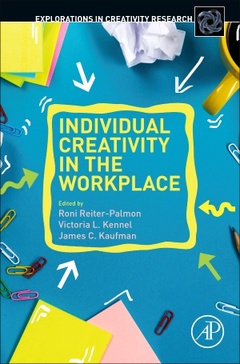Description
Individual Creativity in the Workplace
Explorations in Creativity Research Series
Coordinators: Reiter-Palmon Roni, Kennel Victoria L., Kaufman James C.
Language: English
Subject for Individual Creativity in the Workplace:
Keywords
Invisible colleges framework; 4Ps; Affect; Autonomy; Behavior; Bibliographic coupling; Bibliometric analysis; Bottom-up process; Change; Climate; Cocitation analysis; Cognition; Cognitive resources; Constraints; Core affect; Creative capacity; Creative performance; Creative problem-solving; Creative process; Creative self-behaviors; Creative self-efficacy; Creative styles; Creative thinking; Creativity; Creativity in the workplace; Cross-functional skills; Culture; Demographic diversity; Dual leadership; Emergent constructs; Fuzzy front-end; Group creativity; Idea evaluation; Idea implementation; Idea selection; Impulsivity; Individual creativity; Individual differences; Individual innovativeness; Individual performance; Innovation; Intelligence; Interruptions; Leaders; Leadership; Leadership level; Management; Military; Multitasking; Neuroticism; Organizations; Paradox; Problem solving; Situational strength; Social loafing; Task structure; Thinking skills; Top-down process; US Army
420 p. · 15.2x22.8 cm · Paperback
Description
/li>Contents
/li>Readership
/li>Biography
/li>Comment
/li>
Rapid technological change, global competition, and economic uncertainty have all contributed to organizations seeking to improve creativity and innovation. Researchers and businesses want to know what factors facilitate or inhibit creativity in a variety of organizational settings. Individual Creativity in the Workplace identifies those factors, including what motivational and cognitive factors influence individual creativity, as well as the contextual factors that impact creativity such as teams and leadership.The book takes research findings out of the lab and provides examples of these findings put to use in real world organizations.
Section 1 Creativity and Innovation: Larger Concepts 1. Moving from creativity to innovation 2. Creativity and innovation in organizations 3. The fuzzy front-end: How creativity drives organizational innovation
Section 2: Intelligence and Cognition 4. Interruptions and multiple tasks: Advantages and disadvantages for creativity at work 5. Creative thought processes 6. The intellectual structure and outlooks for individual creativity research
Section 3: Motivation/affect/preferences 7. Creativity styles in the workplace: New versus Different 8. Freedom, structure, and creativity 9. Antecedents and consequences of self-efficacy for creativity in organizations 10. Affective experience and individual creativity at work
Section 4: Leadership and teams 11. The emergence of dual leaders in innovation management: When two heads are better than one 12. The influence of individual innovativeness and intelligence on occupational level among leaders 13. Individuals within a team context
Section 5: Application 14. Fostering creativity in organizations 15. Understanding the role of creativity in the 21st century Army 16. Leadership development: Training creativity skills for leaders
Researchers in creativity, social psychologists, personality psychologists, industrial organizational psychologists.
James C. Kaufman is a Professor of Educational Psychology at the University of Connecticut. He is the author/editor of more than 45 books and 300 papers, which include theoretical contributions such as the Four-C Model of Creativity (with Ron Beghetto) and empirical work, such as the study that spawned the “Sylvia Plath Effect. He is a past president of Division 10 (Society for Psychology of Aesthetics, Creativity, & the Arts) of the American Psychological Association (APA). James has won many awards, including Mensa’s research award, the Torrance Award from t
- Identifies factors facilitating or inhibiting creativity in organizational settings
- Summarizes research on creativity, cognition, and motivation
- Provides real world examples of these factors operating in organizations today
- Highlights creative thought processes and how to encourage them
- Outlines management styles and leadership to encourage creativity
- Explores how to encourage individual creativity in team contexts
These books may interest you

Team Creativity and Innovation 104.06 €



